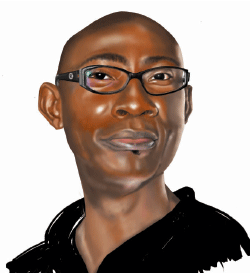A friend of mine called on Wednesday, April 22 – a day after Inspector General of Police (IGP), Suleiman Abba, was fired by President Goodluck Jonathan – to say that my prediction about Abba had come to pass.
“What did I predict,” I asked? “Go back to your column of November 30, 2014 and see whether what you wrote as a form of advice to Abba has come to pass or not regardless of the immediate cause for his sack,” he said.
Abba’s sack without reason was announced by Jonathan’s spokesman, Reuben Abati. He was replaced by Deputy Inspector General of Police (DIG), Solomon Arase.
Since Aso Rock was silent on the real reasons Abba lost his job, Nigerians took their speculation to newspapers and electronics and social media.
Some assume he was sacked because he refused to rig the election in Jonathan’s favour. Others cited insubordination, claiming he failed to redeploy certain key officers from one state to another in the governorship poll in line with Jonathan’s expectation.
There was also speculation that Abba was present where President-elect Muhammadu Buhari, who defeated Jonathan in the ballot, was presented with his certificate of return on April 1. Pundits interpreted that as open affiliation to a political interest.
Whatever be the case, the saying that he who fetches ant infested firewood takes the blame when lizards gather in his house for a party, is apt in the fate that has befallen Abba.
He was not as professional as he ought to be in a democracy. He was booted out this year when he should have been 56 with four years to finish strong as IGP.
Below is the article I wrote on November 30, 2014.
Abba and policing in a democracy
On Tuesday, November 4, President Goodluck Jonathan confirmed Suleiman Abba as substantive Inspector General of Police (IGP). He did after approval was given at a meeting of the Police Council, whose members include former heads of state.
Abba, 55, was promoted from the rank of Assistant Inspector General (AIG) after acting in the post of IG from July 31 following the retirement of Mohammed Abubakar.
Abba has degrees in history and law, like many of his predecessors. His previous posts include Aide-De-Camp (ADC) to the wife of former military Head of State, Maryam Abacha; Assistant Commissioner of Police (ACP) in charge of the Criminal Investigation Department, Federal Capital Territory (FCT) Command; Deputy Force Secretary, and Commissioner of Police, Rivers State.
He enlisted as Cadet Inspector on December 31, 1984 and is due for retirement on March 22, 2019. Meaning that he has another five years to police Nigeria, if everything goes well.
But if the saying that ‘morning shows the day’ is anything to go by, Abba’s reign may go down in the history of the Nigeria police as the most unpopular unless he reads and acts on the counsel in the book, Policing a Democracy.
Since his appointment as acting IG, he has taken some steps that have portrayed the police as a lackey of the government. I will identify shortly, two of such instances because they are very recent and can sink Abba’s career if he does not redress his steps fast.
The role of the police in ensuring that the ethos of democracy are sustained, and even deepened, cannot be over emphasised. In societies where the rule of law is respected, policemen and women who are employed to maintain law and order as well as protect lives and property are held in high esteem.
Section 4 of the Police Act says: “The Police shall be employed for the prevention of crime, the apprehension of offenders, the preservation of law and order, the protection of life and property and due enforcement of laws and regulations with which they are charged, and shall perform such military duties within or without Nigeria as may be required …
“To these functions shall be added (a) protection of the rights of citizens and (b) prompt response to call for assistance by citizens in distress.”
Policing a Democracy, a survey on the role and functions of the police in a post-military era, should be a compulsory read for all police officers in this country.
It reads in part: “In a functional democracy, the police rely on public goodwill and cooperation to carry out their duties, operate within limits of their legally defined power, and are particularly answerable to the judicial branch of government.
“In Nigeria, however, the colonial origin of the police and decades of military rule have produced a militarised force that has acted as an instrument of oppression, and is largely alienated from the civil population it should serve.”
One instance which showed that Abba is yet to alienate himself from the apron strings of the military, and realise that he is serving 170 million Nigerians and not just being an ADC to anybody, is his withdrawal of the security details of House of Representatives Speaker, Aminu Tambuwal, after he defected from the Peoples Democratic Party (PDP) to the All Progressives Congress (APC).
Another instance was on Thursday, November 20 (2014) when the police barricaded the gates of the National Assembly (NASS) to prevent Tambuwal from presiding over the debate on Jonathan’s request for an extension of emergency rule in the troubled North East after one year of a similar exercise that yielded little result.
If Abba wants to know how those two incidents have robbed off on his new regime and what Nigerians are saying about him and his men, he should reflect deeply on the ruling of the Federal High Court, Abuja on Monday, November 24 in the case involving suspected bomber of Nyanya motor park in Abuja, Aminu Ogwuche.
Disbelief and shock describe best the feeling of Nigerians who recall how the police celebrated the arrest of Ogwuche by Interpol from Sudan following the blast that killed 75 persons on April 14 and other incidents allegedly linked to him.
“We wish to authoritatively confirm the interception and consequent arrest of one of the two suspects on the wanted list, Aminu Sadiq Ogwuche who fled to Sudan.
“Ogwuche had been declared wanted by authorities in Nigeria for his involvement in the bombings of Nyanya.
“The efforts of Interpol, Nigeria police and the Department of State Services (DSS) have led to this arrest,” Mike Omeri, Director General of National Orientation Agency (NOA), announced at the time.
But Justice Adeniyi Ademola dismissed the two-count terrorism charge against Ogwuche saying: “This criminal charge is hereby struck out for want of diligent prosecution by the complainant, inspector general of police and his prosecutor.”
It does not matter if the police and the DSS were at loggerheads over the case, what is important is that the court ruling raises the issue of police competence and the seriousness they attach to rising insecurity.
Those who think the judiciary and the executive have a hand in the way the court ruled on the matter are getting things muddled up.
The shoddy way the police discharge their duties did not start with the Ogwuche case nor will it end with it. The latest incident only reminds us of how we have too many criminal suspects being aided to escape prosecution. What Nigerians would have been told by the police would have been that Ogwuche has escaped.
That the court recommended that he should be treated like a human being – having access to the hospital, relations and lawyers – shows what happens in a democracy, unlike the military mentality which Abba is trying to reintroduce.
Former IG Ibrahim Coomassie told his audience in 1999 while receiving an hononary doctorate degree from the Imo State University that “the Force (NPF) has been torn between the civil populace and the military, so much so that its civil traditions are almost lost to military authoritarianism.”
Former Lagos State CP, Abubakar Tsav, warned recently that we are drifting back to the era of militarised policing when the rule of law and order are relegated, for which IGs before Abba worked hard to change through reforms.
Though it was published in The Guardian on October 15, 1997, Okey Ikechukwu’s “The lot of the police” is still apt today. He said: “The police are losing on all fronts. They are distrusted by the public, undefended by the government, and pelted with denigration and criticisms in most cases.”
The reason such must not happen is simple. The police must return to their functions as spelt out in the statue books, juxtapose them in a democratic setting where human and civil rights are respected.
Otherwise, under Abba, they will take us 20 years back.












